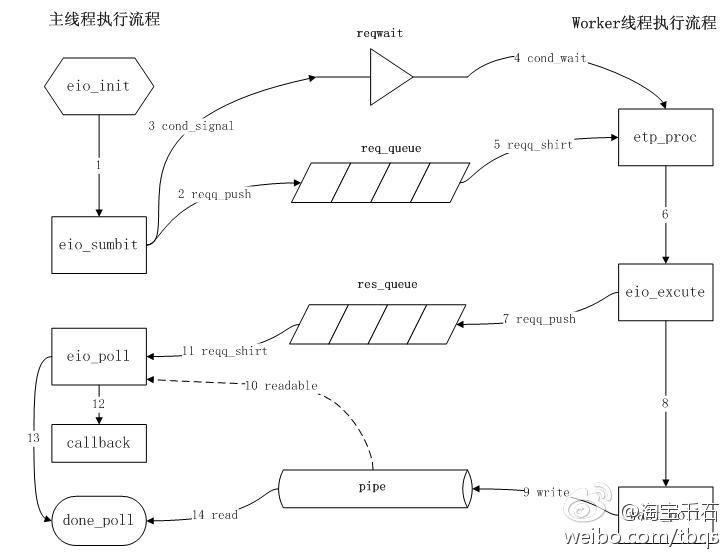Libeio--libeio流程分析

libeio的异步非阻塞实现是通过多线程/队列/锁等方法来实现,线程间通信机制是由使用者自己设计的(下面的测试代码是通过管道来实现的)。
执行的大概步骤:
1.主线程首先通过eioinit函数建立线程间的通信机制(这个机制是要使用者通过设计wantpoll和done_poll来实现线程间通信)。
2.下一步主线程封装一个requst(成员type指向libeio支持的函数名)调用eiosubmit把request放到reqqueue中并启动work线程。
3.worker线程启动后从reqqueue队列中读取request,然后放入resqueue队里中并通过want_poll告知主线程有数据可取。
4.主线程知道后就调用eiopoll从resqueue队列中取出数据并根据request的type调用对应的函数。
测试代码
#include <stdio.h>
#include <stdlib.h>
#include <unistd.h>
#include <poll.h>
#include <string.h>
#include <assert.h>
#include <fcntl.h>
#include <sys/types.h>
#include <sys/stat.h>
#include "eio.h"
wantpoll函数是worker线程调用,donepoll是主线程调用。libeio要user通过这两个函数实现worker线程和主线程之间的通信。
int respipe [2];
/*
* want_poll回调函数,赋值给want_poll_cb
* worker线程通知主线程的机制是通过向 pipe[1]写一个 byte
* 数据(event_loop->poll)
*/
void want_poll (void)
{
char dummy;
printf ("want_poll ()\n");
write (respipe [1], &dummy, 1);
}
//done_poll回调函数,赋值给done_poll_cb
/*
* done_poll回调函数,赋值给done_poll_cb
* done_poll 从 pipe[0]读出一个 byte 数据,该 IO 操作完成
*/
void done_poll (void)
{
char dummy;
printf ("done_poll ()\n");
read (respipe [0], &dummy, 1);
}
//事件循环
void event_loop (void)
{
// an event loop. yeah.
struct pollfd pfd;
pfd.fd = respipe [0];
pfd.events = POLLIN;
printf ("\nentering event loop\n");
// eio_nreqs返回当前正在处理的请求数量。main函数只加入一个request请求eio_nreqs()等于1.
while (eio_nreqs()){
/*
* 等待worker线程的通知,当pipe[0]可读时,就调用eio_poll
*/
poll(&pfd, 1, -1);
/*
* eio_poll->etp_poll完成:
* 1. 调用reqq_shift从res_queue取出数据(eio_req)。
* 2. 调用don_poll_cb回调函数。
* 3. ETP_FINISH->eio_finish->req->finish函数(回调函数,本例中相当于res_cb函数)
*/
printf("eio_poll() = %d\n", eio_poll());
}
printf ("leaving event loop\n");
}
eiofinish->req->finish函数(eionop中把res_cb赋值给req->finish)
int res_cb (eio_req *req)
{
printf ("res_cb(%d|%s) = %d\n", req->type, req->data ? req->data : "?", EIO_RESULT (req));
if (req->result < 0)
abort ();
return 0;
}
int main (void)
{
printf ("pipe ()\n");
/*
* 创建管道
* 在worker线程完成IO请求,通知主线程的机制是需要使用者自定义的
* 这里我们使用pipe(一种常用的线程通知机制)作为通信机制
*/
if (pipe(respipe)) abort ();
printf ("eio_init ()\n");
//eio_init初始化回调函数和res_queue/req_queue等相关数据
if (eio_init (want_poll, done_poll))
abort ();
do{
/*
* eio_nop : 把参数封装成request(eio_req)并eio_submit操作
*
* eio_submit会进行以下操作:
* 1. 把request放入到req_queue队列中(reqq_push操作)
* 2. 告知worker线程有请求到达(cond_signal操作)。
* 3. eio_submit会启动一个work线程
* 启动的work线程会进行以下操作:
* 1. reqq_shift从req_queue取数据。
* 2. cond_wait等待cond_signal的信息。
* 3. 把req放入到res_queue队列中,若want_poll_cb非空,执行want_poll_cb(want_poll_cb指向want_poll)。
*/
eio_nop(0, res_cb, "nop");
event_loop();
}while (0);
return 0;
}
eio_submit函数
ETP_API_DECL void
etp_submit (ETP_REQ *req)
{
req->pri -= ETP_PRI_MIN;
if (ecb_expect_false (req->pri < ETP_PRI_MIN - ETP_PRI_MIN)) req->pri = ETP_PRI_MIN - ETP_PRI_MIN;
if (ecb_expect_false (req->pri > ETP_PRI_MAX - ETP_PRI_MIN)) req->pri = ETP_PRI_MAX - ETP_PRI_MIN;
if (ecb_expect_false (req->type == ETP_TYPE_GROUP))
{
/* group request */
/* I hope this is worth it :/ */
X_LOCK (reqlock);
++nreqs;
X_UNLOCK (reqlock);
X_LOCK (reslock);
++npending;
if (!reqq_push (&res_queue, req) && want_poll_cb)
want_poll_cb ();
X_UNLOCK (reslock);
}
else
{
X_LOCK (reqlock);
++nreqs;
++nready;
/* 把request放入到req_queue队列中(reqq_push操作) */
reqq_push (&req_queue, req);
/* 告知worker线程有请求到达(cond_signal操作) */
X_COND_SIGNAL (reqwait);
X_UNLOCK (reqlock);
/*
* 启动的work线程会进行以下操作:
* 1. reqq_shift从req_queue取数据。
* 2. cond_wait等待cond_signal的信息。
* 3. 把req放入到res_queue队列中,若want_poll_cb非空,执行want_poll_cb(want_poll_cb指向want_poll)。
*/
etp_maybe_start_thread ();
}
}
worker线程
work线程调用etp_proc函数。libeio线程
static void ecb_cold
etp_start_thread (void)
{
etp_worker *wrk = calloc (1, sizeof (etp_worker));
/*TODO*/
assert (("unable to allocate worker thread data", wrk));
X_LOCK (wrklock);
/* 调用etp_proc函数 */
if (xthread_create (&wrk->tid, etp_proc, (void *)wrk))
{
wrk->prev = &wrk_first;
wrk->next = wrk_first.next;
wrk_first.next->prev = wrk;
wrk_first.next = wrk;
++started;
}
else
free (wrk);
X_UNLOCK (wrklock);
}
etp_proc函数
若reqqueue有数据时: 1. 调用ETPEXECUTE->eioexecute(eioexecute最底层的处理函数,根据请求的类型调用相应函数操作),把结果返回给req. 2. 把req数据push到resqueue中,然后调用wantpoll_cb回调函数(通知主线程有数据可读)
若reqqueue无数据时: libeio只允许maxidle个线程处于空闲等待XCONDWAIT,从第max_idle+1个线程开始超时等待(若超时就线程退出)
#define X_THREAD_PROC(name) static void *name (void *thr_arg)
X_THREAD_PROC (etp_proc)
{
ETP_REQ *req;
struct timespec ts;
etp_worker *self = (etp_worker *)thr_arg;
etp_proc_init ();
/* try to distribute timeouts somewhat evenly */
ts.tv_nsec = ((unsigned long)self & 1023UL) * (1000000000UL / 1024UL);
for (;;)
{
ts.tv_sec = 0;
X_LOCK (reqlock);
for (;;)
{
req = reqq_shift (&req_queue);
/* req_queue有数据就跳出循环 */
if (req)
break;
if (ts.tv_sec == 1) /* no request, but timeout detected, let's quit */
{
/* 超时就线程退出 */
X_UNLOCK (reqlock);
X_LOCK (wrklock);
--started;
X_UNLOCK (wrklock);
goto quit;
}
++idle;
/* libeio只允许max_idle个线程处于空闲等待X_COND_WAIT
* 从第max_idle+1个线程开始,进行超时等待判断(若超时就线程退出)
*/
if (idle <= max_idle)
/* we are allowed to idle, so do so without any timeout */
X_COND_WAIT (reqwait, reqlock);
else
{
/* initialise timeout once */
if (!ts.tv_sec)
ts.tv_sec = time (0) + idle_timeout;
if (X_COND_TIMEDWAIT (reqwait, reqlock, ts) == ETIMEDOUT)
ts.tv_sec = 1; /* assuming this is not a value computed above.,.. */
}
--idle;
}
--nready;
X_UNLOCK (reqlock);
/* 收到线程退出的request */
if (req->type == ETP_TYPE_QUIT)
goto quit;
ETP_EXECUTE (self, req);
X_LOCK (reslock);
++npending;
if (!reqq_push (&res_queue, req) && want_poll_cb)
want_poll_cb ();
etp_worker_clear (self);
X_UNLOCK (reslock);
}
quit:
free (req);
X_LOCK (wrklock);
/* 从线程池中移除 */
etp_worker_free (self);
X_UNLOCK (wrklock);
return 0;
}
eiopoll->etppoll
主要是完成resqueue中就绪的eioreq对象的处理。ETPFINISH宏中会调用eioreq中绑定的回调函数(上面测试代码中绑定的函数就是res_cb函数).
#define EIO_FINISH(req) ((req)->finish) && !EIO_CANCELLED (req) ? (req)->finish (req) : 0
ETP_API_DECL int
etp_poll (void)
{
unsigned int maxreqs;
unsigned int maxtime;
struct timeval tv_start, tv_now;
X_LOCK (reslock);
maxreqs = max_poll_reqs;
maxtime = max_poll_time;
X_UNLOCK (reslock);
if (maxtime)
gettimeofday (&tv_start, 0);
for (;;)
{
ETP_REQ *req;
etp_maybe_start_thread ();
X_LOCK (reslock);
req = reqq_shift (&res_queue);
/*
* 取出数据然后调用done_poll_cb回调函数读取线程间的信息
*/
if (req)
{
--npending;
if (!res_queue.size && done_poll_cb)
done_poll_cb ();
}
X_UNLOCK (reslock);
if (!req)
return 0;
X_LOCK (reqlock);
--nreqs;
X_UNLOCK (reqlock);
if (ecb_expect_false (req->type == ETP_TYPE_GROUP && req->size))
{
req->int1 = 1; /* mark request as delayed */
continue;
}
else
{
/*
* 上面测试代码eio_nop中把res_cb赋值给req->finish(ETP_FINISH->eio_finish->EIO_FINISH)
*/
int res = ETP_FINISH (req);
if (ecb_expect_false (res))
return res;
}
if (ecb_expect_false (maxreqs && !--maxreqs))
break;
if (maxtime)
{
gettimeofday (&tv_now, 0);
if (etp_tvdiff (&tv_start, &tv_now) >= maxtime)
break;
}
}
errno = EAGAIN;
return -1;
}
